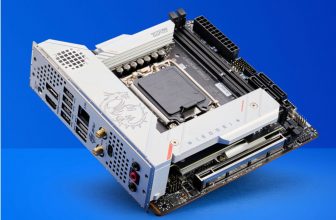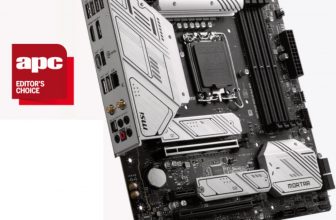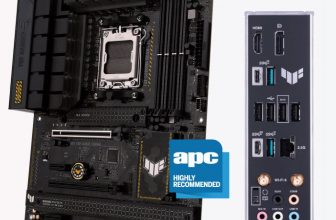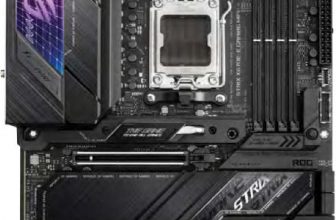MSI MPG B650 CARBON WIFI Review
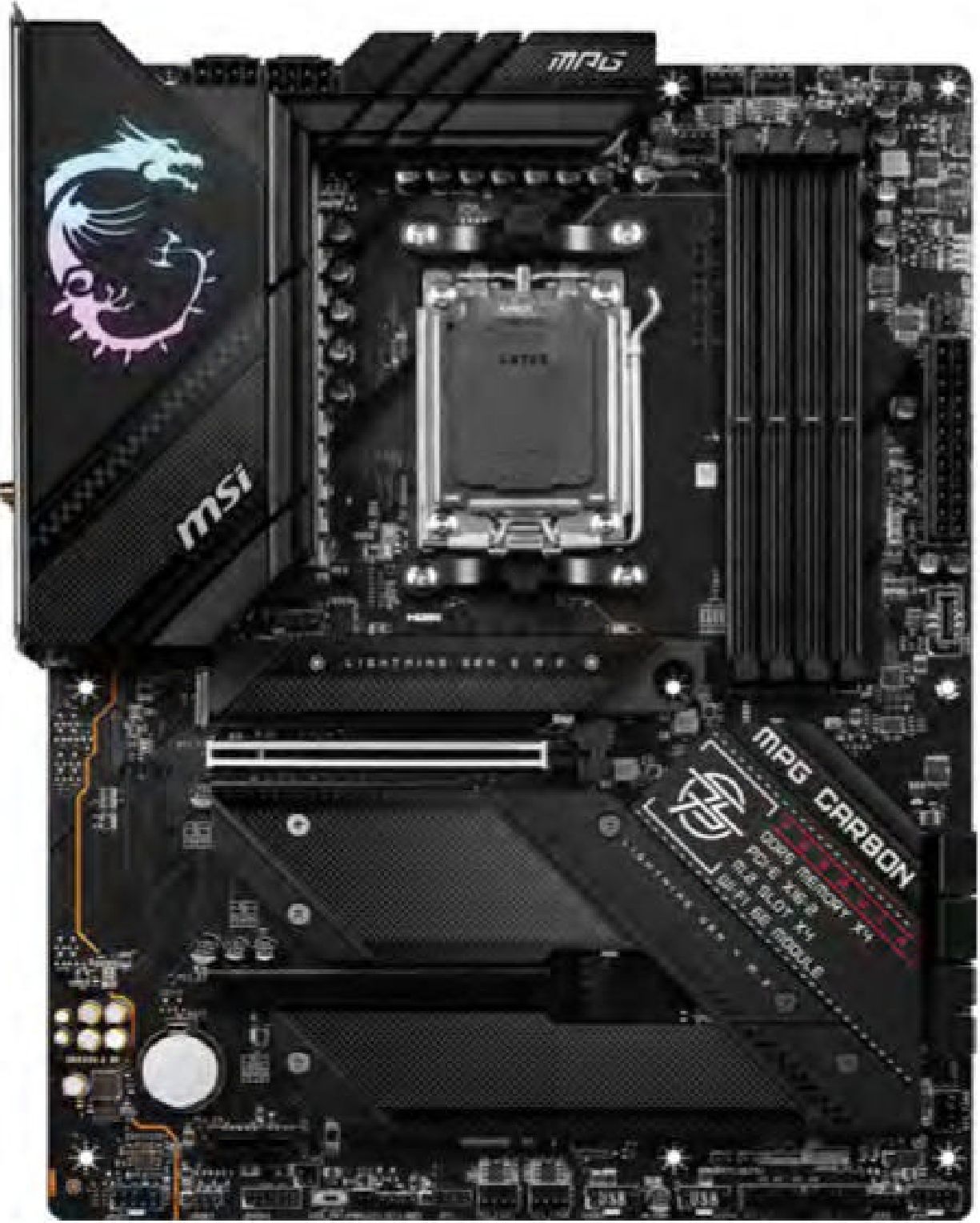
As the first motherboard based on AMD’s new B650 chipset to land in our lab, the MSI MPG B650 Carbon WiFi has plenty of expectations riding on it. One of those is doing what the B450 and B550 chipsets did for Socket AM4, which is making owning a Ryzen system more affordable. Sadly, though, at a price of £ inc VAT, it’s actually more expensive than some X670E motherboards we’ve reviewed, and only around £ cheaper than the excellent ASRock X670E Steel Legend. Read our MSI MPG B650 CARBON WIFI Review.
ATX B650 MOTHERBOARD
ANTONY LEATHER
Part of the reason is that the differences between the two chipsets are minimal, with few low-end X670E boards offering close to the flagship chipset’s maximum number of USB and SATA ports. For example, the ASRock X670E Steel Legend actually has fewer SATA ports than the MPG B650 Carbon WiFi, fewer Type-A USB 3.2 Gen 2 ports on the I/O panel and even one less fan header.
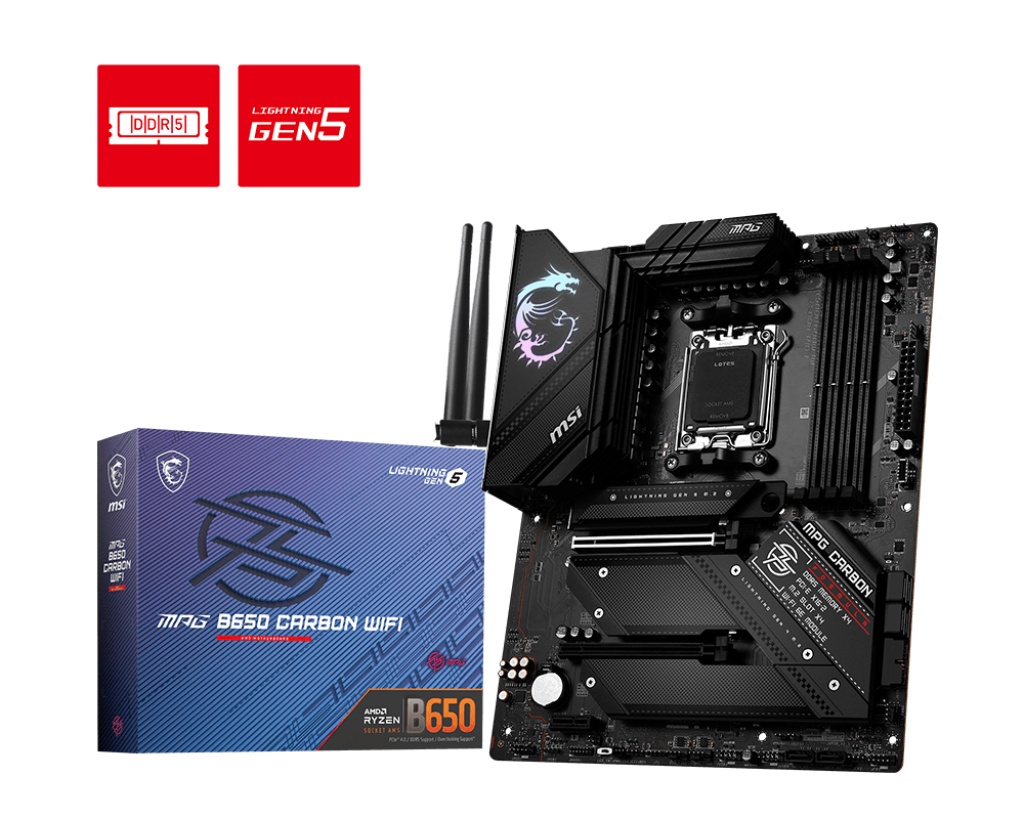
SPEC
| Chipset | AMD B650 |
| CPU socket | AMD Socket AM5 |
| Memory support | 4 slots: max 64GB DDR5 (up to 6600MHz) |
| Expansion slots | Two 16x PCI-E 4, one 4x PCI-E 3 |
| Sound | 8-channel Realtek ALC4080 |
| Networking | 1 x Realtek 2.5 Gigabit LAN, 802.11ax Wi-Fi |
| Cooling | Seven 4-pin fan headers, VRM heatsinks, M.2 heatsinks |
| Ports | 6 x SATA 6Gbps, 1 x M.2 PCI-E 5, 3 x M.2 PCI-E 4, 7 x USB 3.2 Gen 2 Type-A, 2 x USB 3 Type-A, 2 x USB 2 Type-A, 1 x USB 3.2 Gen 2×2 Type-C, 1 x USB 3.2 Gen 2 Type-C header, 1 x LAN, 3 x surround audio out |
| Dimensions (mm) | 305×244 |
Due to the B650 chipset’s limitations compared with X670, though, the MSI board does lag behind when it comes to USB Type-C credentials, only offering a 20Gbps Type-C Gen 2×2 port on the rear panel, with its Type-C header limited to 10Gbps. Comparatively, the ASRock board benefits from Gen 2×2 support on both the rear port and front panel header. Still, the MSI MPG B650 still wins here overall, given it costs less money and has more ports.
We’d argue the MPG B650 Carbon WiFi is better-looking than the ASRock board too, with some chunky heatsinks cooling the quartet of M.2 SSD connectors and the 16 power phases that feed the CPU cores. Speaking of M.2 ports, MSI has one of the best features we’ve seen in a while, which is a tool-free M.2 installation process. The top heatsink has a push-pin operated clip on one side that allows you to remove it without needing a screwdriver, and a small latch then secures the SSD, which is cooled on both sides.
The end result is that there’s no need to deal with fiddly little screws and screwdrivers, and you can install your SSD in seconds. Our only gripes with this system are that the heatsink is quite hard to clip back into place once an SSD is installed, and that the mechanism is only present on that top M.2 slot.
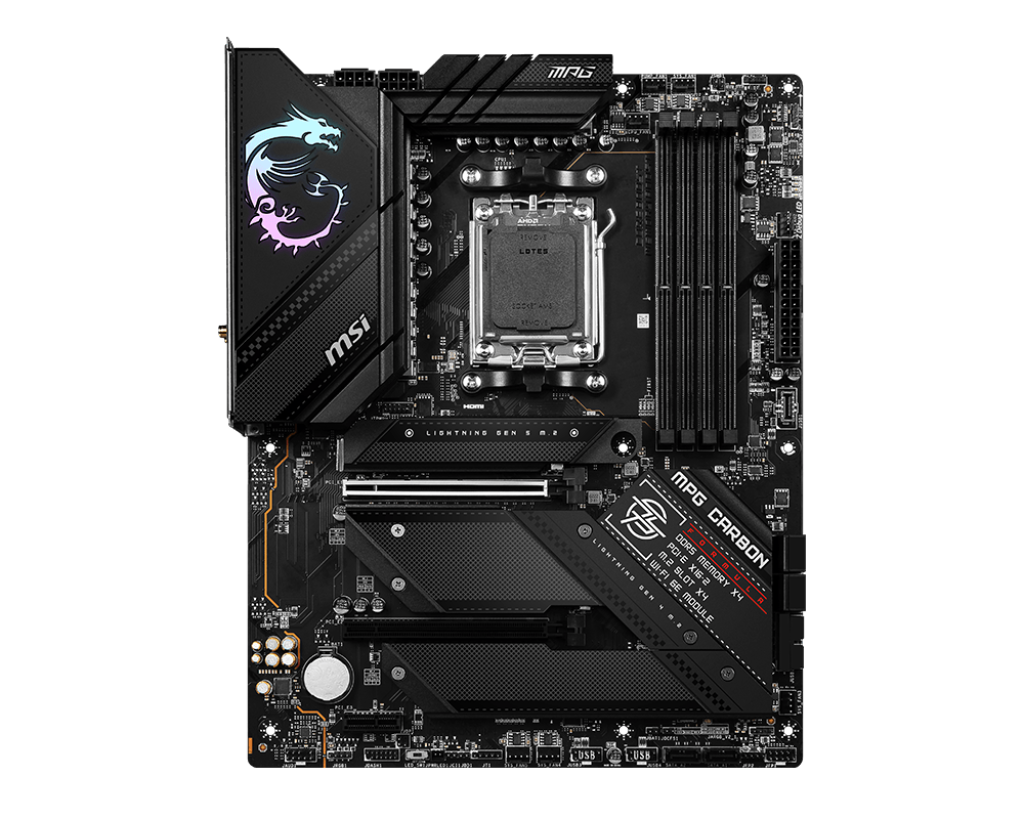
This is a feature we’d like to see on appearing on all motherboards in the future, much like we usually see built-in rear I/O panels these days. That top M.2 slot also supports
PCI-E 5 for (hopefully forthcoming) super-fast SSDs, while the rest are limited to PCI-E 4. The second and third M.2 slots share bandwidth with your graphics card if you use both of them too, with your GPU being knocked back to eight PCI-E lanes (instead of 16) if you use SSDs in both those slots.
MSI has also squeezed both a clear-CMOS button and a USB BIOS flashback button on the rear I/O panel, along with HDMI and DisplayPort outputs, a 2.5 Gigabit Ethernet port and antennas for the 802.11ax Wi-Fi. You also get Realtek ALC4080 audio with an optical output. Sadly, though, despite the board punching above its weight in some areas, there are no handy on-board overclocking or testing tools, such as a POST code display, or on-board power and reset buttons.
The software is also a little clunky, and MSI requires you to first download its MSI Centre software, and then also download an obscure add-on called User Scenario, in order to access its software fan control system. Both this and the fan section in the EFI are easy to use, though, and also allow you to switch temperature inputs beyond just your CPU, although the options sadly don’t include external thermal sensors or your graphics card.
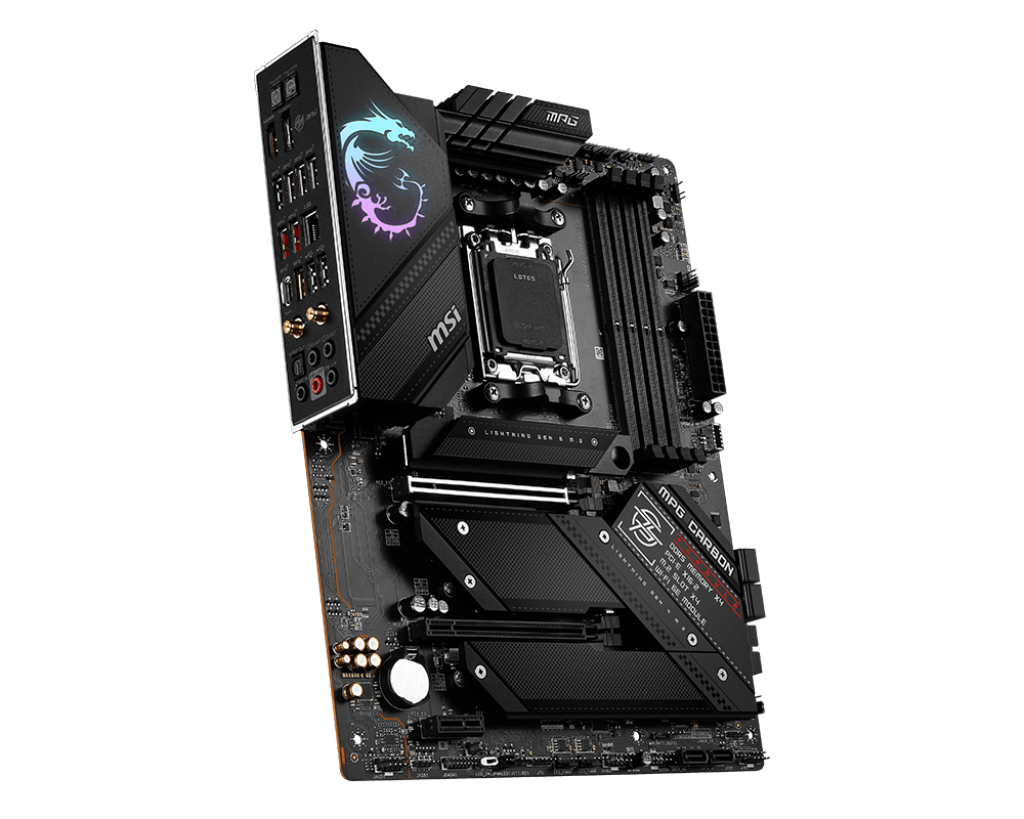
Performance
The fancy M.2 heatsink on the MPG B650 Carbon WiFi’s top M.2 slot kept our PCI-E 4 SSD running at a chilly 54°C and returned some awesome speeds to at 7,406MB/sec and 6,865MB/sec for read and write respectively.
Performance from the Realtek ALC4080 audio was respectable too, offering a dynamic range of 107dBA, noise level of -108d BA and total harmonic distortion (THD) of 0.003 per cent – much better results than we’ve seen from Realtek’s cheaper ALC897 codec.
When dealing with our 16-core Ryzen 9 7950X, the MPG B650 Carbon WiFi’s VRMs hit a peak of 58°C, but the board struggled to maintain a high boost clock with this toasty CPU, particularly under sustained multi-threaded loads, despite the CPU being water-cooled. We’ve seen this CPU regularly hit all-core boost frequencies over 5GHz on other boards, and while the MSI did manage this, it struggled to maintain it – after a few seconds the CPU sat between 4.6GHz and 4.8GHz.
Conclusion
While the MSI MPG B650 Carbon WiFi sadly doesn’t have a significantly lower price than boards based on the top-end X670 chipset, it does have some great features that place it above some of the X670 boards at the cheaper end of this scale. The good news is that, while it’s not particularly cheap, the MSI MPG B650 Carbon WiFi sadly still offers a much cheaper way to own a Socket AM5 motherboard that hasn’t had its features slashed compared with an X670E model.
As a result, while it’s not anywhere near as wallet-friendly as its B450 or B550-based predecessors, the MPG B650 Carbon WiFi is essentially a mid-range premium Socket AM5 motherboard for a bit less cash than boards based on the flagship chipsets.
We don’t recommend pairing it with the top-end Ryzen 9 7950X, but it’s a great choice if you’re looking to build a mid-range Socket AM5 system, as long as you’re happy with a USB 3.2 Gen 2 header rather than Gen 2×2 Type-C, and you’re not planning to use more than two M.2 SSDs.
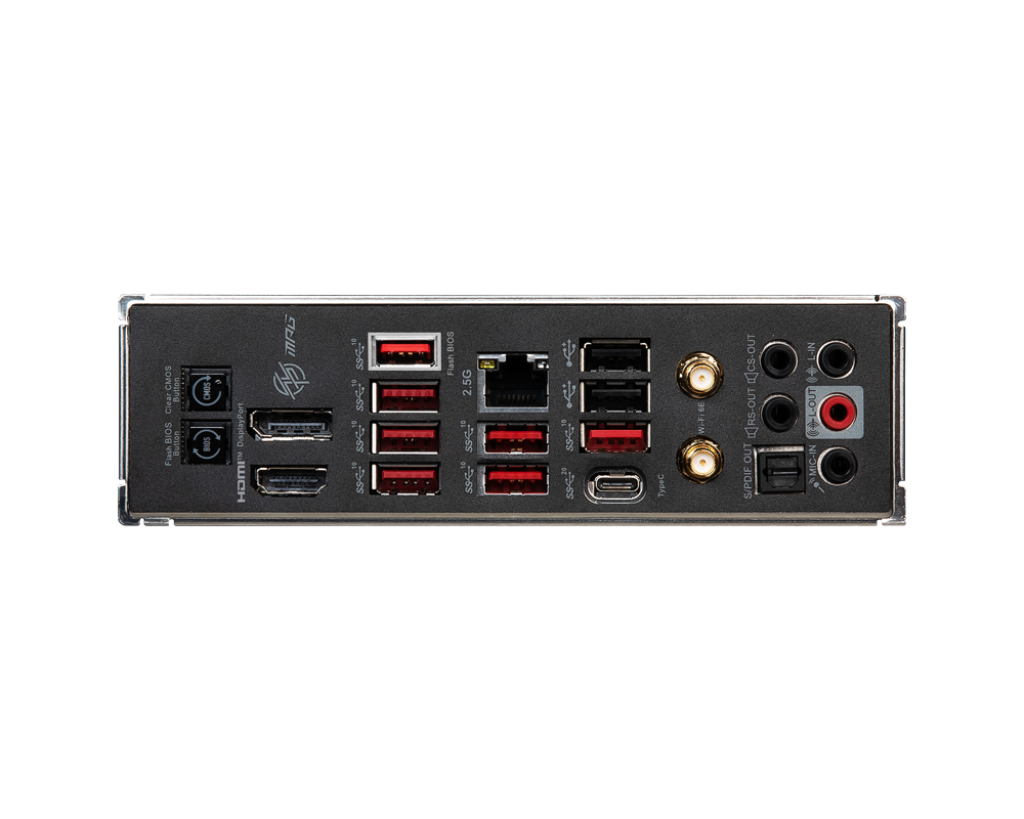
VERDICT
When you purchase through links on our site, I may earn an affiliate commission. Here’s how it works.






